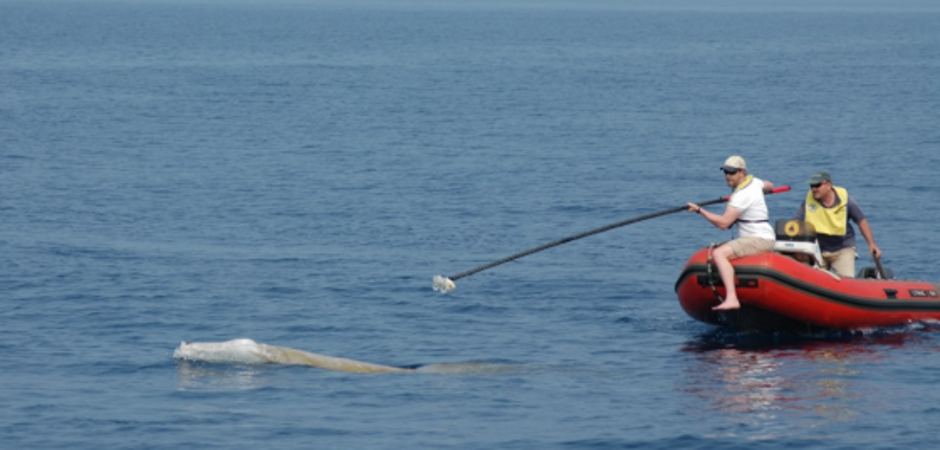
To what extent are behaviors, such as social interactions and predator-prey relationships, determined by the physiological capacity of the individuals involved? How often do animals actually exploit their physiological potential when the dive to great depth, venture to high altitudes or thrive in deserts? These rather simple questions have remained virtually unanswered because we have lacked the possibility to make the relevant physiological measures in the wild.
We have invited a selected group of scientists that asks broad interesting biological questions that are addressed by physiological implants and tags to measure bodily functions in animals. We wish to increase interaction amongst physiologists and ecologists to better understand how the physiology of animals dictates their ecological niche.
15.00 - 16.00: Kjell Johansen lecture by Professor Duncan Mitchell (Witwatersrand University, South Africa):
'Revisiting thermal physiology: misconceptions in predicting responses of mammals to climate change'
16.00 - 17.00: Reception with good wine and even better jokes
09.30: Tobias Wang (Aarhus Institute of Advanced Sciences)
Introduction to workshop
09.40: Andrea Fuller (Witwatersrand University, South Africa)
PLENARY LECTURE: 'From aardvarks to zebras: understanding how large mammals will respond to heat and aridity associated with climate change'
10.30: Coffee break
11.00: Mark Johnson (Aarhus University; St. Andrews, Scotland)
'Deep sea predator-prey interactions unraveled with acoustic tags on marine mammals'
11.15: Pauline Goulet (University of St. Andrews)
'Using multi-sensor tags to decode the fine-scale foraging behaviour of Southern Ocean predators'
11.30: Peter Teglberg Madsen (Aarhus Institute of Advanced Sciences)
'Food turnover and FMR of deep diving toothed whales'
11.45: Laura Stidsholt (Bioscience, Aarhus University)
'Echolocation in wild bats studied with 2 gram tags'
12.00: Lunch
13.00: Mike Fedak (St. Andrews, Scotland)
PLENARY LECTURE: Ecophysiology of diving seals
13.30: David McKenzie (CNRS, Montpellier)
'Using telemetry and biologging to understand the life cycle of a coastal fish'
13.45: Simone Videsen (Bioscience, Aarhus University)
'How humpback whales catch prey: a tag study'
14.00: Marianna Chimienti (BIOS, Aarhus University)
'Taking movement data to new depths the use of high frequency tracking data to reveal movement patterns across spatio-temporal scales'
14.15: Abdulaziz N. Alagaili (King Saud University, Saudi Arabia)
'Coping with Heat and Little Rain: Mammals in the Deserts of Saudi Arabia'
14.30: Christian Ørskov (Bioscience, Aarhus University)
'Biotelemetry in large insects*
14.45: Johannes Overgaard (Bioscience, Aarhus University)
'Field physiology of 1 mg insects'
15.00: Coffee and cake
15.30: Christian Aalkjær (Health, Aarhus University)
'Cardiovascular adaptations to gravitational stress in giraffes'
15.45: Mads Frost Bertelsen (Copenhagen Zoo)
'Anesthesia and surgeries outside the normal clinical setting'
16.00: Asgeir Bjarnason (Star-Oddi, Island)
'Challenges of doing implantable ECG/HR recordings across the animal domain'
16.15: David Michael Scantlebury (Queens University Belfast)'
'Effects of disease on energy expenditure and behaviour on the European badger'
16.30: John Fleng Steffensen (University of Copenhagen)
'Old and cold: Biology of Greenland sharks'
16.45: Emil Aputsiaq Flindt Christensen (University of Copenhagen)
'Living on the edge: physio-chemical environment of brackish water European perch in the western Baltic Sea'
17.00: Reception at Aarhus Institute of Advanced Sciences
18.30: Hot-dogs, refreshments and intellectually stimulating discussions at section for Zoophysiology (building 1131)
The workshop is open to all interested in the topic. To attend the talks including catering, it is necesarry to sign up here by 14 June 2018.